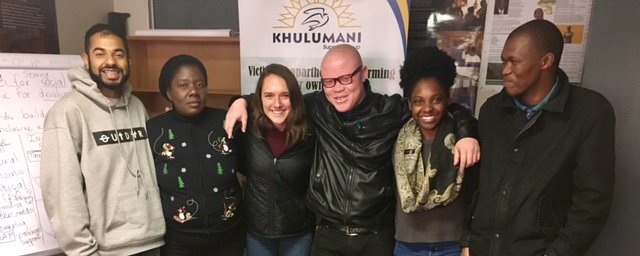Week 9: Moving Forward
Week 9. It's hard to believe my time in South Africa will soon be coming to a close. This week was the beginning of the goodbyes. Tim and Jessica are graduate students from Emory University who also interned at Khulumani this summer. Through their work with Khulumani's Enterprise Development Center and impoverished communities, I learned about hollistic approaches to community development and how to move toward a people-driven economy. Tim and Jessica returned to Atlanta on Saturday. As I said goodbye to them, I realized that somewhere between letting me drag them all over the country every time I heard of a new mountain to hike, and long days in the office laughing at each other's bad jokes - Tim and Jessica taught me about so much more than community development or the economy. They taught me about friendship, how to laugh at myself even on the bad days, and how to keep moving forward in the face of adversity.
Moving forward. This is a concept I have been thinking about a lot this week. I am going to cheat a little bit, and use a blog post I wrote for Khulumani to highlight the struggle to move forward in South Africa's democracy.
They Came in the Night
"Soldiers came in the night. They took my brother away." Sphiwe’s sister recalls the last time she would ever see her brother alive. In 1994, the same year a democracy was born in South Africa, Sphiwe was taken. When his sister thinks back to that night she remembers the police kicking down the door in the middle of the night, beating her brother badly, threatening the whole family, and even hitting her mother before taking Sphiwe away. But that wasn’t the end of it. The police came back, searching for guns. They picked up right where they left off - assaulting and threatening the family. Sphiwe’s family begged the police to tell them where their brother and son was. “Where did you take him? Please, we need to find him,” they pleaded. They were given a sliver of hope when the police told them to look at the police station.
Sphiwe’s family went to the closest police station, but Sphiwe was not there. The family continued to search for him. All across Soweto, they went from police station to police station, mortuary to mortuary, jail to jail. He was nowhere to be found. When reflecting on the early years of looking for her brother, Sphiwe’s sister explains, “We tried and we failed. It’s very traumatic. It’s very painful. We are hurting inside us.”
Sphiwe’s sister tells the story of a family plagued by pain and suffering when describing the impact Sphiwe’s disappearance has had on her family. Sphiwe left children behind. His sister has watched these children grow up without a father. The children still ask about their father, and even have haunting dreams about him from time to time. In many South African cultures, families believe that when a loved one passes on without a proper burial, the person is in limbo. Without the ritual burial, the person is in a dark place between the living and the living dead, or ancestors. When a person is in this state, he will come to his family members in their dreams. Thus, it is impossible for families and communities to find closure without the body of their loved one.
Disappearances not only plague families, but entire communities. In many cases like Sphiwe’s, distrust surrounding apartheid crimes still persists over twenty years later. Sphiwe’s sister explains that when people in her community or other communities ask her about her brother’s whereabouts it makes her wonder why they’re asking. Is it because they know something? Do they know where Sphiwe’s body is? South Africa has been told to forgive and forget. The people have been told to move on, but how can we move forward when we cannot even trust our own neighbors?
When asked about any help she has received, Sphiwe’s sister replies, “Nothing has happened. We do not have peace. We do not have closure. But we do have hope.” Sphiwe’s sister has hope. Hope that the system will stop failing her, failing all the families with missing loved ones, failing the people whose remains are still missing. Cases such as Sphiwe’s need more attention. They need real attention. The people of South Africa have held on to that hope. The people have not once given up – but they are crying out for more. It is time to listen to their cries."
Sharing stories like this one have been one of the most important aspects of my work at Khulumani. The stories I write for Khulumani's blog can be heartbreaking, but they all share one thing: hope. Each story I write reflects that the people of South Africa are trying to move forward despite resistance, oppression, and pain. In the second week that the blog was up and running, it started to get views from all over the world. People have viewed the blog from India, Italy, Spain, Germany, Namibia, and many other countries. If nothing else, I hope that the blog has been a way not just to spread awareness, but also to spread hope. If you haven't had the chance to check it out yet, here's a Link.
Below is a photo of me with Tim, Jessica, Rose, Sanele, and Bongani. Right before this photo was taken, the 6 of us sat together and reflected on the past 3 months. Through teary eyes, Rose (the woman to the left of me) explained that we have become a family. Her words couldn't have been more true. I am so thankful for the friendships I formed with each of these people, and all that they have taught me.
